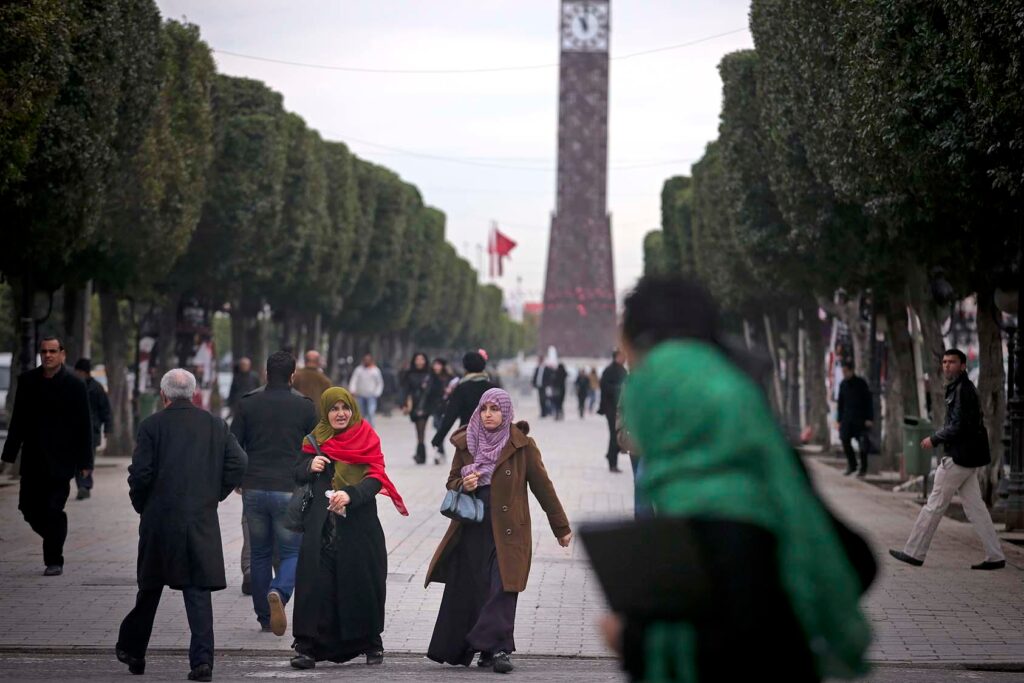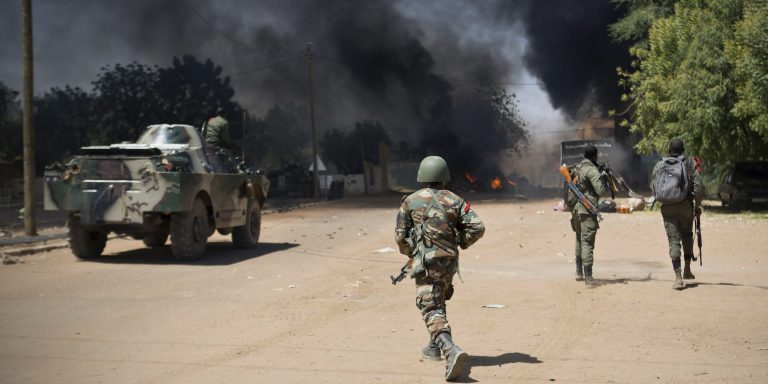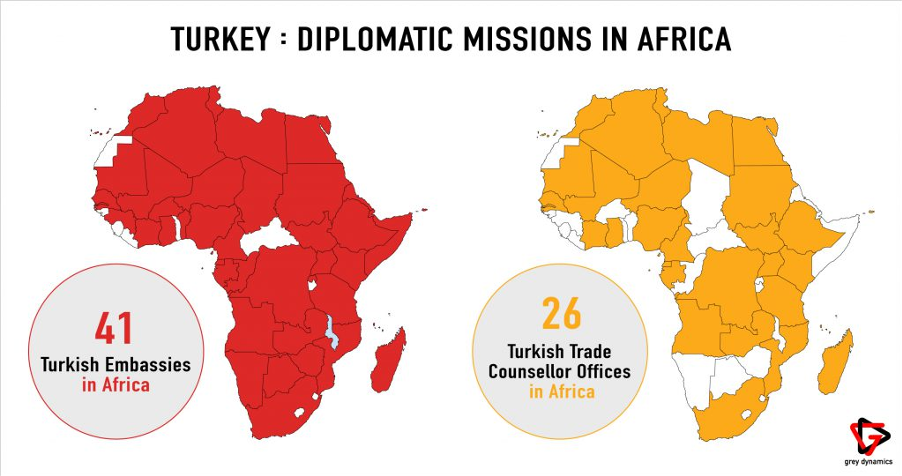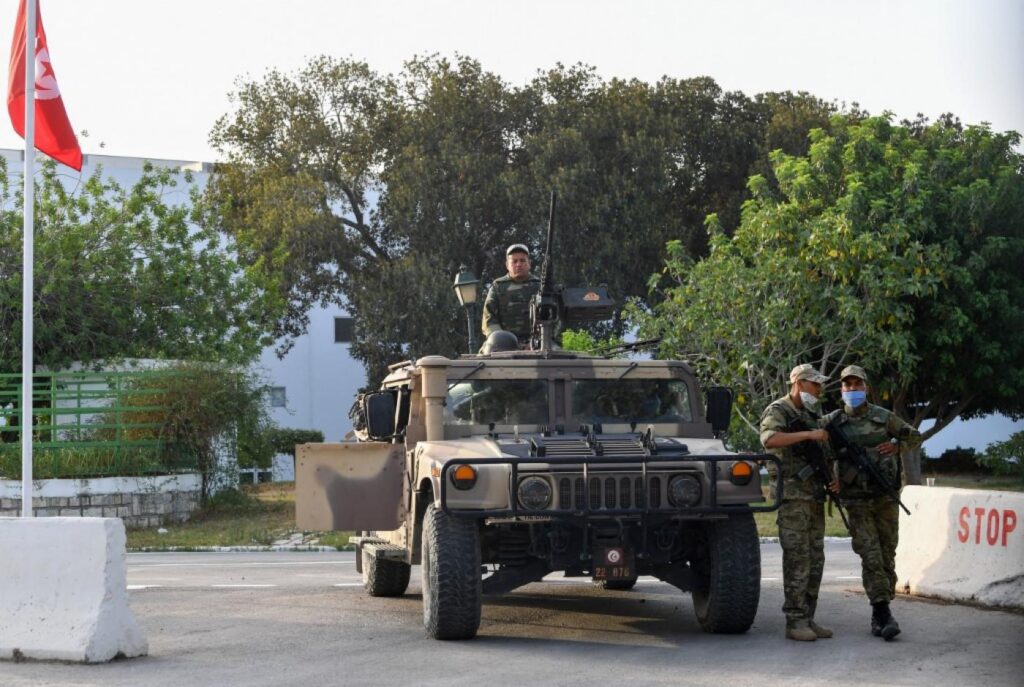
Il s’agit des informations sur Wagner, un groupe de mercenaires russes ultra secret dont les opérations s’étendent au monde entier, des combats de première ligne en Syrie à la surveillance de mines de diamants en République centrafricaine.
La BBC a eu un accès exclusif à une tablette électronique laissée sur un champ de bataille en Libye par un combattant de Wagner, ce qui donne un aperçu sans précédent de la façon dont ces agents travaillent.
Et un autre indice qui nous a été donné à Tripoli – une “liste d’achats” d’équipements militaires de pointe – suggère que Wagner était probablement soutenu au plus haut niveau, malgré les démentis constants du gouvernement russe quant à ses liens présumé avec l’organisation.
Short presentational grey line
Début février, tard dans la nuit je reçois un appel à Londres. Un de mes contacts en Libye m’annonce une nouvelle extraordinaire : une tablette Samsung a été retrouvée sur un champ de bataille dans l’ouest de la Libye.
Une zone dans laquelle des mercenaires russes s’étaient battus en soutien au général dissident Khalifa Haftar, contre le gouvernement d’entente nationale (GNA) soutenu par l’ONU, et on pense que la tablette a été abandonnée lorsque les combattants ont battu en retraite au printemps 2020.
Des informations indiquent depuis longtemps que Wagner opérait en Libye. Des images de surveillance, filmées par des combattants du GNA en avril 2020 et partagées avec la BBC, montraient déjà ces éléments de Wagner.
Mais on disposait de peu d’informations directes.
Le groupe Wagner est l’une des organisations les plus secrètes de Russie. Officiellement, il n’existe pas – servir comme mercenaire est contraire au droit russe et international. Mais on pense que jusqu’à 10 000 agents ont accepté au moins un contrat avec Wagner au cours des sept dernières années.
Après divers processus de vérification, la tablette a été amenée à Londres.
Je l’ai immédiatement placée dans un sac bloquant les signaux, afin qu’elle ne puisse pas être suivie ou effacée à distance.
Fait remarquable, il était facile d’accéder aux informations qu’elle contenait.
J’ai découvert des dizaines de fichiers – allant de manuels sur les mines antipersonnel et les engins explosifs improvisés (EEI) à des images de drones de reconnaissance.
Un certain nombre de livres avaient été téléchargés, dont Mein Kampf, Game of Thrones et un guide sur la fabrication du vin.
Mais c’est une application de cartes qui s’est distinguée : des couches de cartes militaires de la ligne de front, toutes marquées en russe. ;
Des points de couleur étaient marqués sur les cartes, la plupart étant regroupés dans la banlieue d’Ain Zara, dans le sud de Tripoli, où les combattants de Wagner ont affronté le GNA entre février et fin mai 2020.
La tablette contenait également des images de drone d’Ain Zara. La vidéo montre la banlieue déserte, ses habitants ayant fui.
En regardant la tablette, rien ne permet d’identifier le propriétaire, mais en zoomant sur les cartes, des mots sont marqués sur certains des points de localisation rouges.
Mon collègue de la BBC, Ilya, qui est basé à Moscou et enquête sur Wagner depuis quatre ans, a compris qu’il s’agissait de noms de code, peut-être de camarades du propriétaire de la tablette.
Ilya les a comparés à une base de données de combattants Wagner créée par des volontaires ukrainiens et à un rapport de l’ONU qui a fuité et qui répertorie les combattants Wagner en Libye.
Nous pensons que l’un des combattants, qu’on appelle “Metla” sur la tablette, se nomme réellement Fedor Metelkin.
Un Russe de 36 ans, originaire du Caucase du Nord.
Son numéro personnel Wagner, qui est publié dans la base de données ukrainienne, est inférieur à 3 000.
Cela suggère qu’il a rejoint Wagner assez tôt dans ses opérations – il y a cinq ou six ans – lorsqu’il combattait dans l’est de l’Ukraine pour soutenir les séparatistes soutenus par la Russie.
D’après ce que nous savons, il est courant que les mêmes combattants passent d’une zone de conflit étrangère à une autre.
La tablette se trouve désormais dans un endroit sécurisé.
La tablette ne donne pas beaucoup d’indices sur l’identité ou le passé des autres mercenaires, mais la BBC a depuis obtenu un accès rare à deux anciens combattants de Wagner – sous couvert d’anonymat – qui ont confirmé que beaucoup de ceux qui ont commencé en Ukraine sont allés en Libye, pays riche en pétrole.
L’un d’eux a déclaré à la BBC qu’il y avait jusqu’à 1 000 combattants en Libye à tout moment pendant les 12 à 14 mois de combats actifs dans le pays, de septembre 2019 à juillet 2020.
Les anciens combattants ont expliqué que les hommes ne sont pas recrutés par une organisation appelée Wagner, mais qu’ils postulent pour des contrats à court terme – par exemple en tant que travailleurs sur les plates-formes pétrolières ou personnel de sécurité – auprès de nombreuses sociétés écrans.
Ils subissent des tests physiques et des contrôles de sécurité avant de se rendre sur le terrain d’entraînement non officiel de Wagner près de Krasnodar, dans le sud de la Russie, qui se trouve à côté d’une base de l’armée russe.
Ils sont ensuite envoyés à l’étranger, étant entendu que s’ils sont tués, Wagner pourrait ne pas être en mesure de rapatrier leur corps.
Un ancien combattant a souligné que tant l’organisation que les combattants individuels sont motivés par le gain financier. La BBC croit savoir que la plupart des hommes viennent de petites villes, éloignées des grandes agglomérations, où les possibilités d’emploi sont rares.
Ils peuvent gagner jusqu’à 10 fois le salaire moyen en s’engageant avec Wagner, a déclaré l’un des anciens combattants, décrivant ses anciens camarades comme des “Vikings des temps modernes”.
“Chaque fois qu’il y a un conflit armé quelque part, les soldats de Wagner en parlent. ‘On pourrait aller dans celui-là, ça pourrait en être un pour nous’. Parce que chaque contrat et chaque pays, c’est de l’argent. Si vous n’avez pas de contrat, vous restez en réserve, sans argent.”
Il a ajouté que de nombreux agents de Wagner – dont lui-même – ont un casier judiciaire, ce qui rend difficile pour eux de rejoindre l’armée régulière.
Il ne fait guère de doute qu’ils tuent des prisonniers – ce qu’il admet volontiers.
“Personne ne veut d’une bouche supplémentaire à nourrir”.
L’autre ancien combattant nous a dit que l’organisation ne publie aucun code de conduite pour ses agents.
Short presentational grey line
Dans le village libyen d’Espiaa – qui est marqué sur les cartes de la tablette comme une position Wagner – nous avons rencontré un homme qui nous a dit que trois membres de sa famille avaient été tués par des hommes parlant russe.
Selon le procureur militaire libyen Mohammed Gharouda, qui travaille pour le ministère libyen de la défense, ces meurtres font l’objet d’une enquête active pour crime de guerre.
Le village est situé à 45 km au sud de Tripoli, et lorsque nous l’avons visité en avril de cette année, l’homme – que nous ne nommons pas – a rappelé ce qui s’est passé dans l’après-midi du 23 septembre 2019.
Il a dit avoir rencontré un groupe armé sur la route, qui a commencé à tirer en l’air. Il a été suivi jusqu’à la maison de son père, et six ou sept étrangers sont entrés de force. Lui et ses proches ont été fouillés, puis conduits à Qasr bin Ghashir, à environ 20 minutes de route.
Selon le GNA, Qasr bin Ghashir était une base Wagner à l’époque. L’homme dit que lui et ses proches avaient les yeux bandés, les mains attachées et qu’ils ont été conduits dans un camion pendant plusieurs heures avant de revenir le soir même dans une ferme à Espiaa.
Vers six heures du matin, dit-il, ils ont été emmenés dans une petite dépendance du village. Certains des hommes sont alors remontés dans la voiture, mais deux sont restés à l’extérieur, armés de kalachnikovs.
“L’un d’eux a sorti son arme. À ce moment-là, j’ai compris. Je savais qu’il allait tirer. Quand il a commencé à tirer, je suis tombé sur le côté et j’ai fait semblant d’être mort”.
L’un de ses frères a également survécu.
L’homme raconte qu’à un moment donné, il a pu apercevoir ses ravisseurs.
Lorsque nous lui avons montré plusieurs combattants Wagner qui ont été photographiés à Qasr bin Ghashir à l’époque, il a reconnu l’un d’entre eux comme faisant partie des hommes qui les ont enlevés et ont tiré sur lui et sa famille. Nous l’avons identifié comme étant Vladimir Andanov.
Une photo non datée d’Andanov se promenant dans Qasr bin Ghashir a été mise en ligne par des soldats du GNA quelques heures après le meurtre.
Cet homme est soupçonné d’être impliqué dans d’éventuelles exécutions extrajudiciaires de prisonniers de guerre pendant le conflit dans l’est de l’Ukraine.
Des activistes ukrainiens ont identifié l’endroit le plus récent où se trouvait Andanov comme étant l’Afrique du Nord. Mais certaines personnes qui prétendent être ses amis ont nié sur les médias sociaux qu’il se soit rendu en Libye avec Wagner. Ils disent qu’il est chez lui en Russie.
La BBC a également recueilli des témoignages d’autres meurtres de civils attribués au groupe Wagner en Libye. Il s’agit de personnes qui se sont égarées dans une ligne de front active. Les preuves suggèrent qu’une douzaine de civils pourraient avoir été tués par les combattants de Wagner pendant l’offensive de Tripoli. Parmi les victimes figureraient trois hommes et deux femmes dans des voitures civiles, qui ont essuyé des tirs de sniper.
Un combattant du GNA, Mohammed al Kahasy, nous a également dit que quatre hommes combattant à ses côtés ont disparu depuis qu’ils ont été interceptés en décembre 2019.
Short presentational grey line
À côté des points rouges sur les cartes de la tablette, des points noirs indiquent un autre héritage mortel de la présence de Wagner en Libye.
Une enquête plus approfondie révèle qu’il s’agit de positions minées. De nombreuses étiquettes font référence à des types de mines spécifiques, comme la MON-50 ou l’OZM. Il y a également des positions marquées comme “district miné”, “mine télécommandée” ou “étendue” – ce que nous comprenons comme étant de l’argot pour “piège”.
Comme les points rouges, certains des points noirs portent également les noms de code de combattants, ce qui suggère qu’ils ont pu contrôler ces positions de mines particulières. Le mot Metla – le nom de code de Fedor Metelkin – apparaît à nouveau dans ce contexte.
Les 35 positions de mines marquées sur la tablette se trouvent toutes dans le quartier résidentiel d’Ain Zara.
La tablette contient également des illustrations de la mine MON-50 – et de deux autres dispositifs d’origine russe et soviétique, le POM-2 et le PMN-2. Selon un rapport de Human Rights Watch de 2020, ces armes n’avaient jamais été vues auparavant en Libye – où un embargo sur les armes est en vigueur depuis 2011.
Le procureur militaire M. Gharouda affirme que ses autorités ont constaté que le POM-2 était particulièrement répandu et représentait un danger particulier pour les civils qui rentraient chez eux à Tripoli.
La BBC a entendu le témoignage de résidents locaux sur l’étendue des mines et des pièges cachés dans les zones résidentielles, et a vu des photos et des vidéos des dispositifs.
Nous avons contacté une organisation caritative de déminage travaillant en Libye pour l’alerter sur les positions de mines Wagner qui ne sont peut-être pas encore officiellement répertoriées.
Alors que la tablette nous donne un aperçu du lieu et du mode opératoire de Wagner, un document séparé de 10 pages – essentiellement une “liste d’achats” d’armes et d’équipements – nous donne une idée de qui pourrait financer l’organisation.
Le document a probablement été récupéré pendant les combats dans le sud de Tripoli. Il a été remis à la BBC par une source des services de renseignement libyens à Tripoli, qui a enquêté sur la présence de Wagner en Libye, et plus particulièrement sur son implication dans l’offensive sur la capitale.
Il est daté du 19 janvier 2020, le jour même où le président russe Vladimir Poutine a participé à une conférence à Berlin sur un processus de paix pour la Libye.
Nous avons demandé au conseiller en sécurité Chris Cobb-Smith de l’analyser pour nous.
“Je doute fort qu’aucune autre société militaire privée (SMP) – si l’on peut qualifier Wagner de tel – ne bénéficie d’un soutien aussi important que celui dont elle semble bénéficier ici.”
Presentational white space
line
Un indice sur qui pourrait financer l’opération apparaît dans un deuxième document qui nous a été remis.
La note – destinée aux forces Wagner au Mozambique, datée de novembre 2019 et demandant le remplacement d’équipements endommagés – est adressée à “OOO Evro Polis”. Evro Polis est une société russe qui serait bénéficiaire de contrats d’exploitation de champs pétroliers et gaziers en Syrie.
De nombreux articles de presse ont établi un lien entre Evro Polis et l’homme d’affaires de Saint-Pétersbourg, Yevgeny Prigozhin. Utilisant souvent un langage coloré, M. Prigozhin nie avoir des liens avec Evro Polis ou avec Wagner.
Une référence possible à M. Prigozhin apparaît sur le document de la Libye. Denis Korotkov, un journaliste russe qui a enquêté sur le groupe Wagner pendant plusieurs années, dit qu’il pense que le destinataire – “Directeur général” – fait référence à l’homme d’affaires.
Sur les deux documents, à côté des mots “Approuvé par”, on trouve les initiales D.U. Celles-ci font référence à Dmitry Utkin.
M. Utkin, ancien parachutiste des forces spéciales russes, serait le fondateur et le commandant général du groupe Wagner. Lui-même était autrefois connu sous le nom de “Wagner” en raison de son intérêt présumé pour l’Allemagne nazie, qui promouvait la musique du compositeur Richard Wagner.
On pense maintenant qu’il porte le nom de code “Ninth”. Sur les deux documents, on voit le chiffre “9” et le mot “Ninth”.
La BBC a tenté de contacter Dmitry Utkin mais n’a reçu aucune réponse.
Selon l’un des anciens combattants de Wagner à qui la BBC a parlé, les agents ne discutent pas de qui finance l’organisation.
“C’est comme dans Harry Potter, où Voldemort est le nom qui n’est jamais prononcé à voix haute. C’est un sujet tabou. Il ne vaut pas la peine d’en parler, sinon vous risquez de finir dans un conteneur métallique avec un visage cassé pendant deux semaines.”
Dans une déclaration à la BBC, Yevgeny Prigozhin a fermement maintenu qu’il n’avait aucun lien avec Evro Polis ou Wagner.
“Je n’ai rien entendu sur la violation des droits de l’homme en Libye par les Russes et je suis sûr que c’est un mensonge absolu”, a-t-il déclaré.
“Je vous conseille d’opérer avec des faits, pas avec vos sentiments russophobes”.
Auparavant, il a également nié connaître M. Utkin.
En novembre 2018, le général rebelle libyen Khalifa Haftar s’est rendu à Moscou. Des images de l’époque montrent M. Prigozhin lors de la réunion au ministère russe de la Défense.
En janvier 2020, on a demandé à M. Poutine si des Russes combattaient en Libye. Il a répondu : “S’il y a des citoyens russes là-bas, ils ne représentent pas les intérêts de l’État russe, et ne reçoivent pas d’argent de l’État russe.”
Contacté pour un commentaire, le ministère russe des Affaires étrangères nous a renvoyés à des déclarations antérieures.
Il a déclaré que les informations sur la présence d’employés de Wagner en Libye sont principalement basées sur des données truquées et visent à discréditer la politique de la Russie en Libye. “La Russie fait tout son possible pour promouvoir un cessez-le-feu et un règlement politique de la crise en Libye.”
Short presentational grey line
Wagner est apparu dans l’est de l’Ukraine en 2014, aux côtés de sociétés militaires privées et de brigades de volontaires, soutenant les séparatistes pro-russes. Mais c’est en Syrie, en 2016, avec ses opérations contre le groupe État islamique, qu’il a pris de l’importance.
Une action en justice a été lancée au nom d’une famille syrienne pour tenter de contraindre les responsables russes à enquêter sur les combattants de Wagner qui auraient tué un Syrien en 2017.
Deux vidéos mises en ligne sur internet le montraient entrain d’être torturé puis décapité par des hommes le narguant en russe, son cadavre couvert d’écriture en langue cyrillique.
L’activité de Wagner en République centrafricaine (RCA) se poursuit. Il y a trois ans, trois journalistes russes qui enquêtaient sur l’implication de Wagner dans le pays ont été abattus.
Le groupe opérerait également dans d’autres pays africains, dont le Tchad.
“C’est une grande épreuve pour les Russes. Ils ne sont pas en guerre uniquement pour la Libye, ils se disputent le pouvoir décisionnel international en Afrique et dans le monde”, déclare Rabia Bu Ras, membre de la Chambre des représentants de Libye.
En ce qui concerne la présence de Wagner en Libye, la tablette à l’écran fissuré a jeté un nouvel éclairage sur les opérations secrètes du groupe dans ce pays, des mouvements de troupes à la pose de pièges dans les quartiers civils. Son propriétaire et ses camarades ont peut-être quitté depuis longtemps les lieux indiqués sur les cartes affichées à l’écran, mais la BBC croit savoir, d’après des témoignages de civils et des preuves de source ouverte, que, malgré un cessez-le-feu, les combattants sont toujours dans le pays et continuent de saper les efforts de paix.








